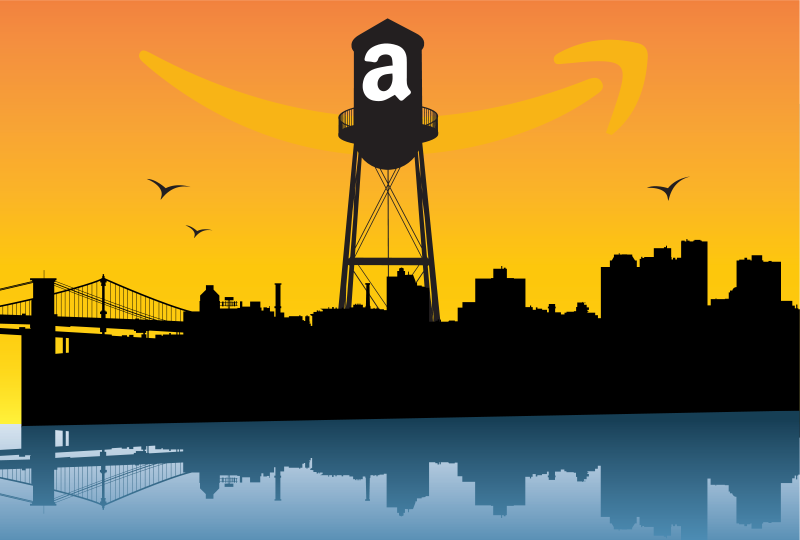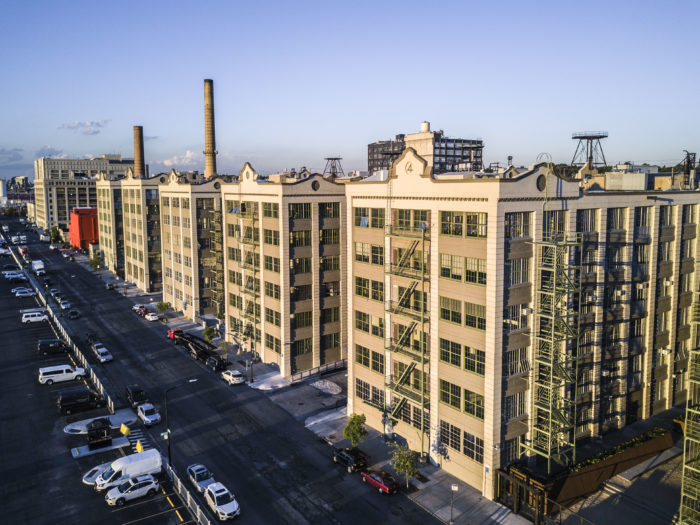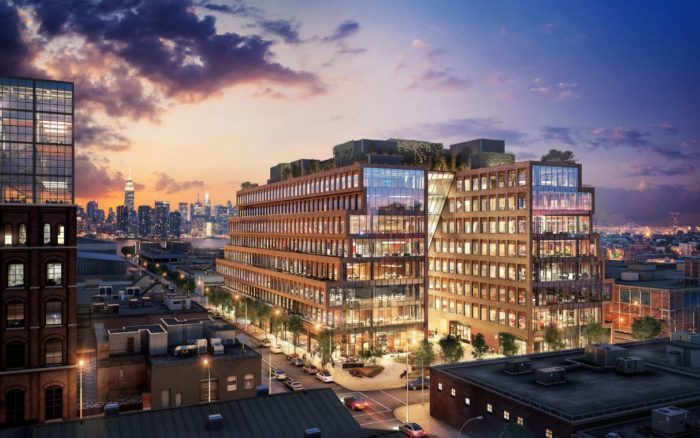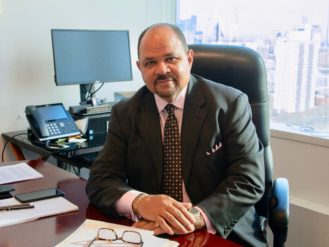How Brooklyn Could Make Room for Amazon’s Second HQ
Sunset Park! Williamsburg! The Innovation Coast! Developers scramble to line up attractive campus sites to lure the online giant
(Illustration by Heather Jones)
Early this month, Amazon kicked off what’s been called “the Olympics of the corporate world” and “the trophy deal of the decade.” Amazon, feeling confined in its home base of Seattle, asked cities across North America to make a case for becoming home to its second headquarters. The winner, Amazon has promised, will be rewarded with a $5 billion investment and as many as 50,000 new jobs with an average salary of more than $100,000.
It would be transformational for the winning city, of course, and in less than a month, Brooklyn has risen to present itself as a serious contender. “We’re going to bring it home, no matter what,” Andrew Hoan, president and CEO of the Brooklyn Chamber of Commerce, promised at a news event on Sept. 13.
Since then the borough has launched its “Brooklyn Prime” campaign, local developers have come forward to make cases for their properties, and real-estate agents have identified suitable neighborhoods for Amazon’s ambitious plans. Hoan, alongside Borough President Eric Adams, started a conversation with City Hall as the NYC Economic Development Corp. solicits ideas for a formal proposal to submit to Amazon, which is due Oct. 19.
New York City, as a whole, “has a really strong case to be home to Amazon’s second headquarters,” said NYCEDC spokesperson Anthony Hogrebe, citing the city’s workforce, academic-and-research institutions, and quality of life. But the city isn’t taking any formal stance in advocating for Brooklyn. “It’s a little early in the process to say where, geographically, we think makes the most sense,” he said. “There’s a diversity of space available. And in New York, there’s the potential to look at multiple sites for different uses that are connected by public transit.”

The Industry City complex in Sunset Park (Photo courtesy of Industry City)
Indeed, Amazon has unique needs for its new HQ—and they’d likely have to get creative if they land in New York City. An eight-page document spells out basic requirements: a metro area with more than 1 million people, a diverse population, high quality of life, abundant technical talent, strong university system, a business-friendly environment and access to mass transit.
Brooklyn, which has developed into a city in its own right, appears to satisfy those requirements. “Brooklyn has grown tremendously in terms of its brand recognition, and I think it’s high time that a large tech company such as Amazon calls Brooklyn home,” said Jakub Nowak, associate broker with the commercial real-estate firm Marcus & Millichap. “Brooklyn, outside of New York City, is the third-largest city in the U.S. It’s also become a cultural epicenter and attracted a tremendous amount of young talent that’s already drawn tech presence into the emerging office sector here.”
But Amazon’s real-estate needs make things more complicated. The company requires existing buildings of at least 500,000-plus sq. ft. to start, with options to expand nearby. That requirement would expand to up to 8 million sq. ft. beyond 2027. (The Seattle campus now takes up 8.1 million square feet over 33 buildings.)
There are just a few corridors in Brooklyn that could potentially meet the demand and would still require significant construction, said Ofer Cohen, president of the Brooklyn commercial real estate firm TerraCRG. Downtown Brooklyn has several sites that could accommodate dense development, “but there’s no one big site that could accommodate the requirement,” Cohen said. “It’ll need to be the assemblage of sites.” The Brooklyn Navy Yard also potentially offers enough space for new construction, he added.
The area that’s gotten the most attention is Sunset Park, home to the 35-acre office campus Industry City, now owned by Jamestown Properties and Belvedere Capital. “We think we have a very unique asset,” said Andrew Kimball, Industry City’s chief executive. “It’s beautiful adaptive reuse that we’ve pumped about $250 million into.” He cited business and job growth at the complex since its $1 billion redevelopment kicked off in 2015, plus an existing partnership with the NYU Tandon School of Engineering.
Another major perk is its proximity to large-scale sites “that could be part of a broader campus,” Kimball said, like the Liberty View Industrial Plaza to the north. Not only does Liberty View offer roughly 1 million available square feet, it’s already home to an Amazon distribution center. “One of the most defining characteristics [of Industry City],” said Kimball, “Is where else do you find 6 million sq. ft. that will grow to close to 7 million, and already has an eclectic mix of companies?” Jamestown said this week that it has applied for a rezoning to allow the prospective expansion.
Not everyone would welcome Amazon to Sunset Park with such excitement. The neighborhood, home to strong immigrant communities from Latin America and China, has already seen changes in the form of gentrification and rising real-estate prices. The local activist group Uprose believes “the Amazon bid would be just the latest in a long line of uninvited changes to the community,” the Village Voice reported. As executive director Elizabeth Yeampierre told the Voice, “They’re trying to create Williamsburg in Sunset Park. They’re not involving the community in any of these decisions.”

A rendering of the future office building 25 Kent in Williamsburg (Image courtesy of 25 Kent)
As for the Brooklyn borough president and Chamber of Commerce, they’ve elected to promote a broader range of properties along the borough’s so-called “Innovation Coast,” which includes waterfront parcels from Greenpoint to Sunset Park. “With several prime options along Brooklyn’s Innovation Coast already in construction or in planning stages, we can accommodate Amazon’s immediate and long-term needs,” Hoan told The Bridge. “With the construction of the BQX [waterfront streetcar], Amazon employees would be able to seamlessly move from home to workplace and enjoy world-class views.”
The development 25 Kent, the first ground-up commercial office built in Williamsburg in 60 years, has been suggested as one component of a coastal Brooklyn headquarters by its developer, Rubenstein Partners. “Phase one [of Amazon’s proposal] is a 500,000 sq. ft. requirement by 2019, and 25 Kent is a 500,000-sq. ft. building that we’ll deliver toward the end of 2018,” said Jeremiah Kane, director of Rubenstein’s New York City office. “In that respect it’s a logical option.” Kane said this week that he and other developers have cobbled together enough North Brooklyn properties to meet Amazon’s eventual need of 8 million sq. ft.
Details have yet to be released on any prospective tax incentives the city might offer, which is another factor Amazon is considering, and might help offset New York City’s high costs of construction and living compared to other contending cities. While Brooklyn offers relatively cheaper land options than Manhattan, “we know that New York will not win a race to the bottom,” said Hogrebe, of the NYCEDC. “The city’s argument will be why New York City is the only place you’d want to establish yourself as one of the most dynamic and exciting tech companies in the decades ahead.”
And many are betting on Brooklyn as the city’s best showpiece for innovation and growth. “Companies are already looking to Brooklyn to energize their search for what’s next in their business,” said Kane. “Brooklyn’s become the place where you go capture the creative people who can do that.”













